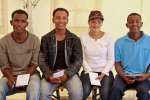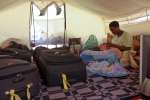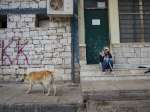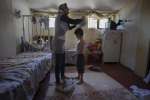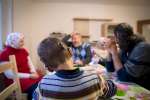Group of 153 refugees leave Malawi for new lives in Denmark
News Stories, 29 March 2007

DZALEKA REFUGEE CAMP, Malawi, March 29 (UNHCR) – Each week a group of refugees in Malawi collect a grant from the UN refugee agency and make an unlikely search for clothes that will keep them warm in Denmark's northern European winter.
Life for 153 refugees is changing drastically: the weather, the food in the shops, the schools their children will attend, the homes they will live in. Above all, in Denmark they will have a chance to again take charge of their own lives.
"Life will be different but it will be better," said Michelin Kakonge, shortly before leaving Malawi for Denmark with her three children on March 19. "Here, I am just sitting waiting to get monthly food rations, but there I will be able to work and support myself."
The 44-year-old Congolese widow and her three daughters – aged 14, 13 and 10 – had been living in Dzaleka Refugee Camp, which is operated by the government and UNHCR, since arriving in Malawi in September 2000. Her husband had been killed by government soldiers, who then came looking for her. With no one to help support the family, she sold most of the monthly food ration provided to refugees to buy other essentials.
Refugee camps are welcome sights to anyone escaping war and persecution; but they are not places where many people would choose to spend their lives. Malawi has been generous in accepting refugees, most from around the Great Lakes region further north, but it is a poor, crowded country that presents few prospects of a normal life for refugees. Chances to work or grow their own food will always be limited.
"Life here is very difficult," said Lisette Kabange, whose husband was targeted over his work monitoring human rights abuses in the Democratic Republic of the Congo (DRC). "We are not working; we are just waiting for rations."
Kabange was due to move with her husband, her three young children, two sisters and a brother-in-law in the next of the staged departures to Denmark. The 32-year-old Congolese woman, who wants to study nursing, said she would start by adding Danish to the French, Swahili and tribal languages she speaks.
Danish officials selected the Burundian and Congolese refugees late last year from cases presented by UNHCR. Most were victims of the violence that has plagued their home regions or were at continuing risk – widowed women heading families, people fleeing persecution.
Resettlement is not offered to every refugee, or even many. The solution for most of the millions of refugees around the world is voluntary repatriation or integration in the host country. Only when there is no possibility of that outcome, or clear risks in remaining, is resettlement the desired solution. The decision to accept refugees for resettlement is made by receiving countries, not the refugee agency.
UNHCR emphasises that the number resettled – less than 30,000 worldwide in 2006 – is limited and is anxious to ensure resettlement programmes do not act as magnets attracting applicants who will never qualify. Although UNHCR resettled 635 refugees from Malawi in 2006 – a high number for a country with only about 9,000 refugees – the number will drop this year.
"We are looking at refugees who are victims of violence or torture and people at risk," said Dawn Sparks de la Rosa, a consultant in UNHCR's Malawi office who has overseen the resettlement to Denmark. "Most refugees would not meet the criteria for resettlement."
The 153 refugees destined for Denmark – including two born since interviews for resettlement were conducted – began moving on February 19. Further departures were set for March 5, 12, 19 and 20 with the final group leaving on April 2.
UNHCR provides those departing with a grant of US$70 to buy warm clothing, though they need more on arrival because shops in Malawi – with daily temperatures around 30 degrees Celsius – would never stock heavy coats.
On arrival, they are dispersed to towns around Denmark and begin the process of integration – including two years of language instruction. It is likely to be successful; after the suffering these refugees experienced, they are anxious to start new lives.
"I will integrate because I have no intention to return to my country," said Elias Ekyamba, a 34-year-old French teacher who fled DRC in 2001 after his mother was killed and he was targeted for being from the wrong tribe. His wife and four children stood smiling outside their grass-roofed hut, beside a door covered in flattened food aid tins. "I intend to be part of Danish society," he stressed.
By Jack Redden in Dzaleka Refugee Camp, Malawi






